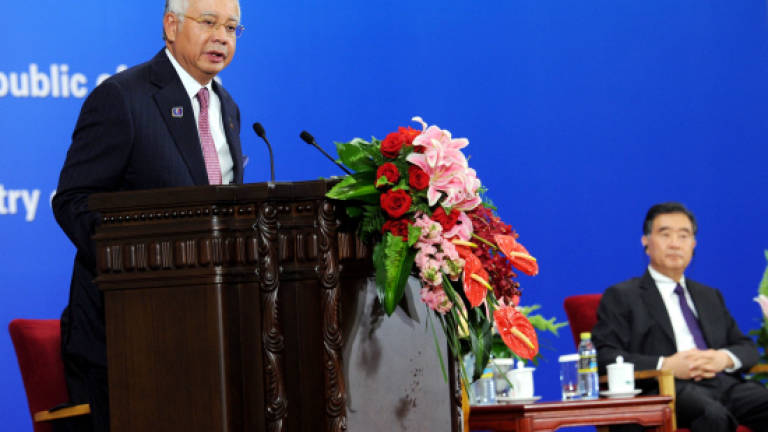Malaysia, China to take Asean-China FTA to next level

BEIJING: Malaysia and China are working together to take the Asean-China free trade agreement (FTA) to the next level, Prime Minister Datuk Seri Najib Abdul Razak said.
He said Malaysia and China are working together to deliver the Regional Comprehensive Economic Partnership, an FTA between Asean countries and its existing FTA partners, in 2015 and this effort could be intensified as China chairs the Asia-Pacific Economic Cooperation (Apec) this year and Malaysia takes over the reins of Asean next year.
"We know that China will continue to work with us to create an open, facilitative, competitive and inclusive Asia.
"Likewise, Malaysia stands ready to work closely with China, as it chairs APEC this year," he said at the opening of the China-Malaysia High Level Economic Forum here today.
Also present was the Vice Premier of China's State Council Wang Yang.
The business forum is part of the China-Malaysia Economic Summit co-organised by the Ministry of International Trade and Industry (Miti), the Chinese Ministry of Commerce (Mofcom) and the Malaysia-China Business Council (MCBC).
Asean has existing FTAs with six countries -- Australia, China, India, Japan, Korea and New Zealand.
At the forum, Najib also encouraged more Chinese investors to set up operations in Malaysia, and to pursue their regional expansion from Malaysian shores.
He said Malaysia presents a highly attractive business environment as it was ranked sixth in the World Bank's "Ease of Doing Business" report, and 12th in the recent World Competitiveness Yearbook.
Furthermore, he said, Malaysia's Economic Transformation Programme has unleashed opportunities in a host of sectors across its economy.
"As we look to manage our respective national development, we should seek to capitalise on synergies wherever they emerge," he said, noting the two nations have established a number of joint endeavours to promote Chinese-Malaysian business co-operation.
"In recent years we have established both the Qinzhou (Chingchou) Industrial Park, and the Malaysia-China Kuantan Industrial Park.
"These groundbreaking twin parks make it easier for our businesses to collaborate, and open up new opportunities for our investors and entrepreneurs," he said.
In support of the development, he said the Chinese Central Government has approved a 2.4 billion renminbi development fund for the Qinzhou Industrial Park on top of the 1 billion renminbi already pledged by the Government of Guangxi.
He said the Malaysian Federal and State Governments have allocated RM700 million to the Malaysia-China Kuantan Industrial Park.
Najib said Malaysia and China also signed a Five Year Programme for Economic and Trade Cooperation in October last year to form the basis of Malaysia-China economic cooperation for the next five years and provide a firm foundation for bilateral economic relations for decades to come.
The five-year programme, he said, is a broad agreement that provides for bilateral cooperation in agriculture, energy and mineral resources; information and telecommunications; manufacturing, infrastructure, and engineering; and tourism, logistics and retailing.
"The Five Year Programme reflects a commitment between our two Governments to enhance our trade and investment environment, emphasising business and investment opportunities, including in the area of sustainable development.
"It was drawn up in close collaboration with the private sector, with Government ready to support implementation and tracking," he said.
He said the activities outlined in the Five Year Programme draw on the economic reforms and liberalisation programmes undertaken by both countries.
"In China's case, urbanisation and the move towards a consumption-based economy open up a host of opportunities in sectors such as renewable energy, healthcare, financial services, retail, human capital development, and sustainable development," he said.
Najib said both countries also have a strong track record of financial co-operation as Malaysia is the first country outside China to use the renminbi for trade settlement.
He said Malaysia's central bank is the first in Asean to hold renminbi reserves and 2.3 per cent of world trade settled in renminbi was conducted in Malaysia. However, he said, too few entrepreneurs are aware of the existence of such a facility and more efforts should be taken to deepen and promote the monetary co-operation, which could benefit both countries.
Najib said as Malaysia and China are connected by history, both countries share strong people-to-people ties and economic connections which have stood the test of time.
He said when the global financial crisis struck in 2009, Malaysia's trade with China continued relatively unscathed and the bilateral trade surged in 2010 and continued to grow despite the unfolding crisis.
China went on to become Malaysia's largest trading partner, a position it has retained to this day, he added. He said the bilateral trade has also moved from trading in raw commodities to high-value manufactured goods.
Last year, Malaysia-China bilateral trade stood at US$106 billion with foreign direct investment from China hitting US$920 million, up from US$646 million in 2012. China is Malaysia's single largest trading partner while Malaysia is China's largest trading partner in Asean.
Najib expressed confidence that as both countries celebrate 40 years of diplomatic relations, they would build on their strong economic connections and usher in a new era of shared prosperity.
"Our economic relationship is going from strength to strength, but we can do much more," he said.
The prime minister later witnessed the signing of 11 memorandums of understanding between Malaysian companies and their Chinese counterparts. – Bernama